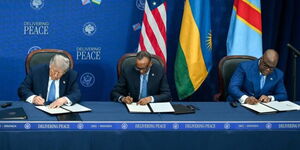The Federation of Kenyan Employers(FKE) led by their President Dr. Habil Olaka, has rejected a bill seeking to stop employers from calling their staff after checking out from their work places.
Speaking during a press conference on September 15, Olaka outlined the reasons for rejecting the legistlation, which he termed radical and oblivious to the realities of the workplace.
According to Olaka, the amendment will make it difficult for employers to run their companies and strain the relationship between employers and workers.
“The proposed amendment introduces radical and stringent measures that will curtail the employer’s prerogatives to manage enterprises and pose challenges to industrial relations in Kenya,” Olaka stated.
“These proposed changes negate the essence of freedom and the realities of the labour market,” he added.
The FKE president went on to state that employers' administrative rights should not be hindered by legislation, something that would happen should the bill be passed.
Further, Olaka condemned the bill saying it would foster a culture of indiscipline and disharmony in the workplace since according to FKE it creates two centers of managerial power.
“The ILO has provided instruments which have been successful in managing working hours and overtime payment,” he explained.
The president claimed that the draft law proposes that employers restrict their employees' phone usage outside work hours, a suggestion that FKE strongly disagreed with.
“An employee has the right to keep their phone on or off if it's a personal phone. If it's an official one, then the employee is under obligation to use it as required by the enterprise,” Olaka elaborated.
Moreover, The doctor noted that the bill was very restrictive, especially for companies that require working hours extended or that use a shift system.
According to Olaka, when employees work after hours they are paid overtime in accordance with the General Wages Order.
The chairman championed flexibility in the workplace which he termed crucial since COVID and even more so in this post-COVID era.
Ultimately, president Olaka asserted that working hours were a matter between employees and employers that is addressed through human resource departments in business enterprises and should not be legislated.












